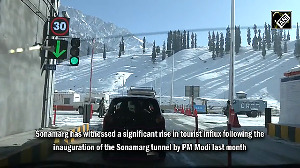China's response to the Tibetan uprising in the last one month has been harsh and appears to be following the previous policy of "strike hard" to snuff out any dissent for its rule in Tibet and other portions of the country. As indicated by events in the capital city of Tibet, Lhasa on March 14 and other places, this policy is likely to be continued further in the run-up to the Olympics in August and after.
However, given the widespread response of the Tibetans within Tibet and outside and the groundswell of support from different governments and civil society groups in the world, the entire issue is turning out to be a foreign policy failure in the making for China. A majority in the foreign policy establishment of China appears to be now geared towards curbing the negative fallout arising out of the Tibetan protests.
China did make frantic efforts in reaching out to different "allies and friends" in the aftermath of March 14. However explicit support to Beijing came from only a few countries such as Russia, Pakistan, Iran, Venezuela, Latvia, Malaysia, Singapore and others, while several countries have expressed reservations on Beijing's handling of the Tibet issue.
If the effort of bidding and conducting Olympics is to showcase China's rise to the world, popular indictments at the global and Tibetan levels have unnerved Beijing. For so long Tibet is considered to be the minimalist foreign policy position for China, while the Olympics indicated its bidding for global legitimacy for its policies.
In the initial official rhetoric, the Chinese government critiqued the Dalai Lama as the one who had 'organised, premeditated, masterminded and instigated' uprising in Lhasa on March 14.
While the Dalai Lama denied such charges, nevertheless, there appears to be a disjuncture in the Tibetan movement inside Tibet as compared to protests outside. For, one of the main demands of the Tibetans in Tibet is not related to Olympics but to oppose the Chinese government's plan to relocate nearly three million Han Chinese and Muslims in Lhasa and the deteriorating unemployment situation for Tibetans in Tibet. Rising unemployment among the Tibetans, despite the Chinese government showcasing Tibet as a favourable business destination, is also mentioned frequently as one of the main grievances of those who have participated in the Tibetan uprising.
Also, after the Tibetan movement spread to other parts of China, specifically in traditional Tibetan areas such as Amdo (Qinghai Province) and Kham (now integrated into Sichuan province), and to other parts of the globe (such as in the protests against the Olympics torch at London, Paris, San Francisco, New Delhi, Jakarta, Bangkok, Canberra, Tokyo and other places), the Chinese official criticism is now directed against Tibet Youth Congress, instead of targeting the Dalai Lama alone.
On April 10, for instance, the official Chinese news agency Xinhua, carried reports suggesting that Tibet Youth Congress 'is no different from Al-Qaida, Chechnyan armed terrorists, East Turkistan separatists and any other terrorist organisation'. This political line appears to be intensified by the Chinese government in the run-up to the Olympics and after in order to drive a cleavage in the Tibetan community -- pitching the TYC against the Dalai Lama.
Nearly, five decades of Chinese rule in Tibet contributed to the emergence of pro-Chinese Communist Party section within Tibetans. This section has been co-opted into the decision-making process in Tibet, although high-level posts are still are in the hands of Han-ethnic persons. These sections of Tibetan cadres are also pitched to be in the forefront of resistance against the Dalai Lama and Tibetans living abroad.
These sections have much to lose (as with the Han leaders) if the Tibetan conflagration goes beyond China's hand. Mutual symbiosis between the two then is the emerging glue and acts as a powerful force at the disposal of the Chinese government. Thus, when the Chinese government stated, in the aftermath of the March 14 incident, that it would wage a "people's war" against the independent forces in Tibet, the people here are those who are co-opted by the Chinese system in Tibet.
China is also changing its tactics in the current imbroglio. Unlike in the 1959 and 1989 uprisings, the Chinese leadership in the current case is pitching Han-nationals against Tibetans. Packaging the Olympics as a part of the 'national rejuvenation and glory' and any efforts to block such sport events as 'politicisation' or even efforts to deny China its due place 'under the sun', the leadership is mobilising Han nationals against Tibetan 'sabotage', thus deflecting the global attention on the central Tibetan issue of identity and autonomy.
Differences in the Chinese leadership are likely to become more explicit in the coming months in terms of handling the Tibet issue. While Hu Jintao, Wen Jiabao and Li Keqiang are considered to be in league in the nine-member Standing Committee of the Politburo of the Communist Party along with another member Zhou Yongkang the internal security minister in overall-charge, including Tibet, all eyes will be on the rising star of the party Xi Jinping for his views on the subject.
Xi, who was named as the vice president of China recently, had indicated during his tenure in Fujian Province that reform and opening up is essential for China and that he is favourably disposed towards commercial contacts. The post Olympics situation is likely to usher in acute debates within the Communist Party, much like during the Tiananmen Square incident two decades ago. Although the bottom line is to retain Tibet in China, methods to resolve the perennial Tibetan unrest could intensify internal political debates in the party.
As a reflection of the above, internal changes in Tibet have already commenced. Although official rhetoric of China continued to be critical of 'the Dalai clique' for instigating violence in Lhasa, quietly internal changes commenced in Tibet -- indicating to the central government reprisals on Tibetan officials. After nearly a fortnight of the March 14 incident in Lhasa, the Chinese government sacked Danzeng Langjie, director of Tibet's Ethnic Minority and Religious Affairs Commission. He was replaced by Luosang Jiumei, vice secretary of the Communist Party committee of Lhasa since 2004. More heads are likely to roll.
Srikanth Kondapalli is associate professor, Jawaharlal Nehru University






 © 2025
© 2025